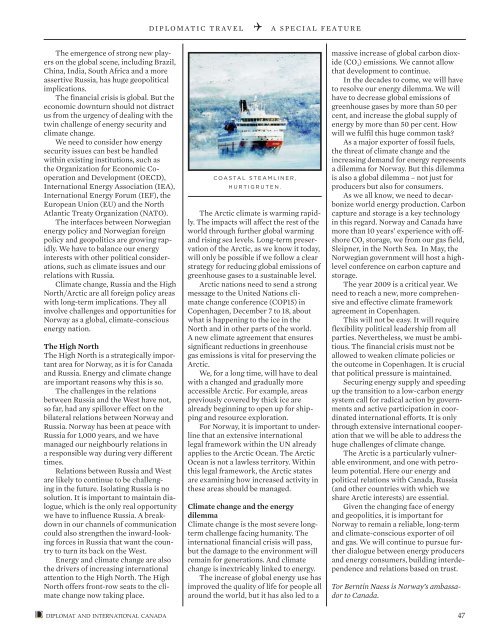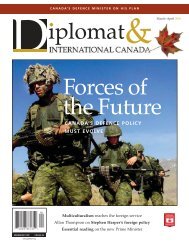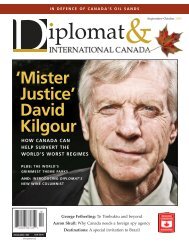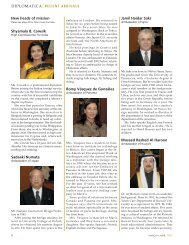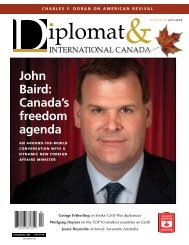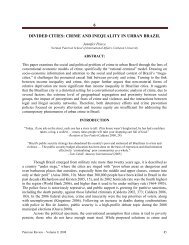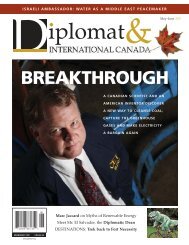Lord Jim of Dilling - Diplomat Magazine
Lord Jim of Dilling - Diplomat Magazine
Lord Jim of Dilling - Diplomat Magazine
- No tags were found...
You also want an ePaper? Increase the reach of your titles
YUMPU automatically turns print PDFs into web optimized ePapers that Google loves.
D I P L O M A T I C T R AV E L Q A s p e c i a l f e a t u r eThe emergence <strong>of</strong> strong new playerson the global scene, including Brazil,China, India, South Africa and a moreassertive Russia, has huge geopoliticalimplications.The financial crisis is global. But theeconomic downturn should not distractus from the urgency <strong>of</strong> dealing with thetwin challenge <strong>of</strong> energy security andclimate change.We need to consider how energysecurity issues can best be handledwithin existing institutions, such asthe Organization for Economic Cooperationand Development (OECD),International Energy Association (IEA),International Energy Forum (IEF), theEuropean Union (EU) and the NorthAtlantic Treaty Organization (NATO).The interfaces between Norwegianenergy policy and Norwegian foreignpolicy and geopolitics are growing rapidly.We have to balance our energyinterests with other political considerations,such as climate issues and ourrelations with Russia.Climate change, Russia and the HighNorth/Arctic are all foreign policy areaswith long-term implications. They allinvolve challenges and opportunities forNorway as a global, climate-consciousenergy nation.The High NorthThe High North is a strategically importantarea for Norway, as it is for Canadaand Russia. Energy and climate changeare important reasons why this is so.The challenges in the relationsbetween Russia and the West have not,so far, had any spillover effect on thebilateral relations between Norway andRussia. Norway has been at peace withRussia for 1,000 years, and we havemanaged our neighbourly relations ina responsible way during very differenttimes.Relations between Russia and Westare likely to continue to be challengingin the future. Isolating Russia is nosolution. It is important to maintain dialogue,which is the only real opportunitywe have to influence Russia. A breakdownin our channels <strong>of</strong> communicationcould also strengthen the inward-lookingforces in Russia that want the countryto turn its back on the West.Energy and climate change are alsothe drivers <strong>of</strong> increasing internationalattention to the High North. The HighNorth <strong>of</strong>fers front-row seats to the climatechange now taking place.C o a s ta l s t e a m l i n e r ,H u r t i g r u t e n .The Arctic climate is warming rapidly.The impacts will affect the rest <strong>of</strong> theworld through further global warmingand rising sea levels. Long-term preservation<strong>of</strong> the Arctic, as we know it today,will only be possible if we follow a clearstrategy for reducing global emissions <strong>of</strong>greenhouse gases to a sustainable level.Arctic nations need to send a strongmessage to the United Nations climatechange conference (COP15) inCopenhagen, December 7 to 18, aboutwhat is happening to the ice in theNorth and in other parts <strong>of</strong> the world.A new climate agreement that ensuressignificant reductions in greenhousegas emissions is vital for preserving theArctic.We, for a long time, will have to dealwith a changed and gradually moreaccessible Arctic. For example, areaspreviously covered by thick ice arealready beginning to open up for shippingand resource exploration.For Norway, it is important to underlinethat an extensive internationallegal framework within the UN alreadyapplies to the Arctic Ocean. The ArcticOcean is not a lawless territory. Withinthis legal framework, the Arctic statesare examining how increased activity inthese areas should be managed.Climate change and the energydilemmaClimate change is the most severe longtermchallenge facing humanity. Theinternational financial crisis will pass,but the damage to the environment willremain for generations. And climatechange is inextricably linked to energy.The increase <strong>of</strong> global energy use hasimproved the quality <strong>of</strong> life for people allaround the world, but it has also led to amassive increase <strong>of</strong> global carbon dioxide(CO 2) emissions. We cannot allowthat development to continue.In the decades to come, we will haveto resolve our energy dilemma. We willhave to decrease global emissions <strong>of</strong>greenhouse gases by more than 50 percent, and increase the global supply <strong>of</strong>energy by more than 50 per cent. Howwill we fulfil this huge common task?As a major exporter <strong>of</strong> fossil fuels,the threat <strong>of</strong> climate change and theincreasing demand for energy representsa dilemma for Norway. But this dilemmais also a global dilemma – not just forproducers but also for consumers.As we all know, we need to decarbonizeworld energy production. Carboncapture and storage is a key technologyin this regard. Norway and Canada havemore than 10 years’ experience with <strong>of</strong>fshoreCO 2 storage, we from our gas field,Sleipner, in the North Sea. In May, theNorwegian government will host a highlevelconference on carbon capture andstorage.The year 2009 is a critical year. Weneed to reach a new, more comprehensiveand effective climate frameworkagreement in Copenhagen.This will not be easy. It will requireflexibility political leadership from allparties. Nevertheless, we must be ambitious.The financial crisis must not beallowed to weaken climate policies orthe outcome in Copenhagen. It is crucialthat political pressure is maintained.Securing energy supply and speedingup the transition to a low-carbon energysystem call for radical action by governmentsand active participation in coordinatedinternational efforts. It is onlythrough extensive international cooperationthat we will be able to address thehuge challenges <strong>of</strong> climate change.The Arctic is a particularly vulnerableenvironment, and one with petroleumpotential. Here our energy andpolitical relations with Canada, Russia(and other countries with which weshare Arctic interests) are essential.Given the changing face <strong>of</strong> energyand geopolitics, it is important forNorway to remain a reliable, long-termand climate-conscious exporter <strong>of</strong> oiland gas. We will continue to pursue furtherdialogue between energy producersand energy consumers, building interdependenceand relations based on trust.Tor Berntin Naess is Norway’s ambassadorto Canada.diplomat and international canada 47


